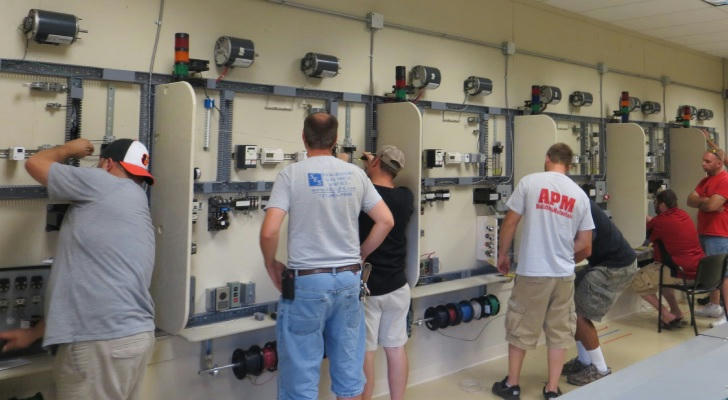Powering Your Career: The Electrician Course Handbook
In today’s technology-driven world, the demand for skilled electricians continues to grow. Electricians play a vital role in ensuring the safe installation, maintenance, and repair of electrical systems in residential, commercial, and industrial settings. An electrician course is a comprehensive training program designed to equip individuals with the technical knowledge and practical skills required to excel in this field. This article explores the scope of application, employment prospects, an overview of the test questions, and tips to achieve a score of 85 or above in the electrician course.

Scope of Application of the Electrician Course
The electrician course covers a wide range of applications, making it a versatile and essential qualification for anyone pursuing a career in electrical work. The scope of the course includes:
Residential Electrical Systems
Electricians are trained to install, maintain, and repair electrical systems in homes. This includes wiring, lighting, circuit breakers, and safety devices like ground fault circuit interrupters (GFCIs).
Commercial and Industrial Electrical Systems
The course prepares students to handle more complex electrical systems found in offices, factories, and industrial plants. This includes working with high-voltage equipment, transformers, and three-phase power systems.
Renewable Energy Systems
With the growing emphasis on sustainability, electricians are increasingly involved in installing and maintaining solar panels, wind turbines, and other renewable energy systems.
Electrical Safety and Compliance
Electricians must adhere to strict safety standards and regulations. The course emphasizes the importance of safety protocols, electrical codes, and compliance with local and national regulations.
Automation and Smart Technology
As smart homes and automation become more prevalent, electricians are required to work with advanced systems like home automation, IoT devices, and energy management systems.
Troubleshooting and Repairs
The course equips students with the skills to diagnose and fix electrical faults, ensuring the efficient operation of electrical systems.

Employment Prospects for Electricians
The employment prospects for individuals who complete an electrician course are highly promising. The growing reliance on electrical systems across various industries ensures a steady demand for skilled electricians. Key employment opportunities include:
Construction Industry
Electricians are essential in the construction sector, where they install electrical systems in new buildings and renovations.
Maintenance and Repair Services
Many electricians work in maintenance roles, ensuring that electrical systems in homes, offices, and factories operate smoothly.
Renewable Energy Sector
The shift toward renewable energy has created new opportunities for electricians specializing in solar, wind, and other green technologies.
Manufacturing and Industrial Settings
Electricians are in demand in manufacturing plants to maintain and repair machinery and electrical systems.
Self-Employment
Many electricians choose to start their own businesses, offering services to residential and commercial clients.
Government and Public Sector
Electricians are also employed by government agencies to maintain public infrastructure, such as street lighting and public buildings.
According to labor market trends, the demand for electricians is expected to grow steadily in the coming years, driven by advancements in technology and infrastructure development. Additionally, electricians often enjoy competitive salaries, job stability, and opportunities for career advancement.
Introduction to Electrician Course Test Questions
The electrician course typically concludes with an examination to assess the student’s understanding of both theoretical concepts and practical skills. The test questions are designed to evaluate competency in key areas of electrical work. Below is an overview of the types of questions students can expect:
Theoretical Questions
These questions test the student’s knowledge of electrical principles, such as Ohm’s Law, circuit analysis, and electrical safety standards.
Example:
What is the formula for calculating electrical power in a circuit?
Explain the purpose of a residual current device (RCD).
Practical Application Questions
These questions assess the student’s ability to apply theoretical knowledge to real-world scenarios.
Example:
How would you troubleshoot a circuit that keeps tripping the breaker?
Describe the steps to safely install a new electrical outlet.
Code and Regulation Questions
Electricians must be familiar with electrical codes and regulations. These questions test their understanding of compliance requirements.
Example:
What is the minimum wire size required for a 20-amp circuit according to the National Electrical Code (NEC)?
List three safety precautions to follow when working on live electrical systems.
Diagram Interpretation
Students may be asked to interpret electrical diagrams or schematics.
Example:
Identify the components in the given circuit diagram.
Draw a wiring diagram for a three-way switch setup.
Safety and Risk Assessment
Safety is a critical aspect of electrical work. These questions evaluate the student’s ability to identify hazards and implement safety measures.
Example:
What personal protective equipment (PPE) should be worn when working on electrical panels?
How would you handle an electrical fire in the workplace?
Mathematical Calculations
Electricians often need to perform calculations related to voltage, current, resistance, and power.
Example:
Calculate the total resistance of a series circuit with three resistors: 10Ω, 20Ω, and 30Ω.
Determine the power consumption of a device operating at 120V and drawing 5A of current.
Achieving a Score of 85 or Above
Scoring 85 or above in the electrician course requires a combination of thorough preparation, practical experience, and effective test-taking strategies. Here are some tips to help you achieve this goal:
Master the Fundamentals
Ensure you have a strong understanding of basic electrical principles, such as Ohm’s Law, circuit analysis, and power calculations. These concepts form the foundation of the course.
Practice Regularly
Solve as many practice questions as possible, especially those related to diagrams, calculations, and code compliance. This will help you become familiar with the exam format and improve your problem-solving speed.
Focus on Safety
Safety is a critical component of the electrician course. Memorize key safety protocols, PPE requirements, and emergency procedures to excel in safety-related questions.
Understand Electrical Codes
Familiarize yourself with the National Electrical Code (NEC) and other relevant regulations. Pay attention to common code requirements, such as wire sizing, grounding, and circuit protection.
Review Diagrams and Schematics
Practice interpreting and drawing electrical diagrams. This skill is essential for both the exam and real-world electrical work.
Take Mock Exams
Simulate the exam environment by taking timed mock tests. This will help you manage your time effectively and identify areas where you need improvement.
Seek Clarification
If you encounter challenging topics, don’t hesitate to ask your instructors or peers for help. Clarifying doubts early will prevent confusion during the exam.
Stay Organized
Create a study schedule and stick to it. Allocate time for each topic, ensuring you cover all areas of the syllabus.
Stay Calm and Confident
On the day of the exam, stay calm and read each question carefully. Avoid rushing and double-check your answers before submitting.

The electrician course is a gateway to a rewarding and dynamic career in the electrical industry. With its broad scope of application, ranging from residential wiring to renewable energy systems, and its strong employment prospects, this course is an excellent choice for individuals seeking a stable and fulfilling profession. The comprehensive examination ensures that graduates are well-prepared to meet the demands of the job market, combining theoretical knowledge with practical skills. By following the tips outlined above, you can achieve a score of 85 or above, setting yourself apart as a highly competent and skilled electrician. Whether you’re starting your career or looking to upskill, the electrician course offers a pathway to success in an ever-evolving field.
